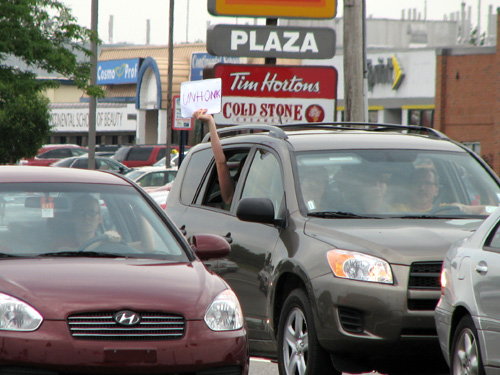by Norman Fulkerson
The following report recounts the adventures of a group of nine young men who are campaigning on the streets of the State of New York for traditional marriage.
"Finally someone has common sense."
There was a "gay" pride parade last weekend here in town. I can't imagine how the public accepted that because the response from the general public today was overwhelmingly positive.
A police officer stopped early in the campaign and seemed very favorable. He gave his cell phone number and told us to call him if we had any trouble. Several other police cruisers honked when passing through our intersection.
One lady passed and said "Finally someone has common sense."
She took a flier and added "they are going to know [what is right] when they meet the Lord." A little while later another lady crossed the same sidewalk and simulated a honk. She then turned to the intersection and shouted to the drivers of the cars, "Honk your horns, honk your horns!"
Pedestrians simulating horns is not an uncommon thing in these campaigns, but we had one today that was the most amusing I have seen so far. It was from a very picturesque black lady wearing a bright orange shirt. She stopped on the opposite side walk, looked over the campaign, and began jumping up and down yelling "Honk!" She was so loud she could be heard on all four corners of the intersection. She then walked across the street with a big smile on her face, jumping up and down and waving at us in support as she continued to honk her imaginary horn.
"You are gaining many blessings... "and a crown in heaven."
A Puerto Rican took a flier and I wanted to make sure she understood what we were doing so I explained that we are defending traditional marriage. She pointed to the happy newlyweds on the cover of our flier and said, "Marriage is between one man and one woman. It's not between one man and one man. That's nasty."
Moments later a very sympathetic black lady passed. "Keep on doing what you are doing, you are gaining many blessings." She then pointed to the sky and added "you are gaining many crowns and they [who practice homosexuality] are going to get AIDS."
A man took the flier after I said "defend traditional marriage". He responded, "I believe in traditional marriage, it's in the Good Book." Right after he passed a women hesitated before taking a flier and asked, "is that for marriage". After I responded that it was she said, "but is that traditional marriage" to which I again responded yes. She then smilingly took the flier and said, "I am honking."

Counter Protesters, Spittle and an Unjustified Parking Ticket
Towards the end of the campaign a group of 7 or 8 young people came and began screaming slogans on the opposite corner to ours. Mr. Charles Sulzen had stopped playing his bagpipes at that point but quickly started anew. Right as he began one of the girls attempted to scream but was drowned out by the instrument.
Two squad cars came immediately and the officers spoke with them for a long time. We were about to close up campaign when, to our surprise, the whole group crossed the street right in front of the police officers and stood right in front of our campaign and began provoking our people. As is our custom we said nothing in response but I motioned for the police officers on the opposite street corners to do something about their provocative presence.
The officers finally came to our side of the street. I could not help but ask them the logic of allowing such a rowdy group to come to our side of the street. The officer informed me that he told them they could cross as long as they didn't say anything to us. The whole scene made no sense but I let the officer know that I did not understand what had just occurred considering we are always peaceful and legal whereas their attitude was insulting and very aggressive.
By the grace of God they only stayed some minutes before crossing to the other side of the street. The honks were deafening which might have been the reason they could not tolerate being in our presence any longer. Their aggression only served to confirm the convictions of those who passed and caused them to take a flier when they might not have otherwise.
We immediately prayed to finish and the officers thanked us for a peaceful campaign. When we arrived to our car we found a disturbing sight. We were issued a parking ticket in spite of the fact that we had another hour left on the meter which we photographed for evidence. It was obvious by the disgusting spittle on the driver side window why we were given a ticket.
In the afternoon we did a campaign in Palmyra, NY, and received a lot of support in this very sleepy town as well.
Contact the Caravan
To contact the caravan, email them at tfp@tfp.org This e-mail address is being protected from spambots. You need JavaScript enabled to view it
How to Support the Caravan
If you want to help protect the sacred institution of marriage, please consider filling our van's gas tank with fuel and keep us on the road for traditional marriage.
If you would like to make your contribution by mail, please send a check payable to The American TFP and mail it to:
The American TFP
P.O. Box 251
Spring Grove, PA 17362.










